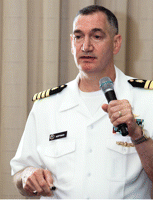Mental health services in the U.S. armed forces increasingly include complementary and alternative approaches for alleviating pain, stress, and psychological trauma, reported panelists at APA's annual meeting in Honolulu in May.
In part, this represents a wider trend in American society, said preventive medicine specialist Nisha Money, M.D., M.P.H., chief medical officer for integrative medicine, resilience, and prevention at the Defense Centers of Excellence for Psychological Health and Traumatic Brain Injury (DCoE).
Americans spent more than $33 billion out-of-pocket in 2007 for complementary and alternative medical treatments, noted Money, a former U.S. Air Force physician.
There is a perception among many patients that conventional medications are not effective or have unacceptable side effects, she said, so clinicians "should be more aware of these other approaches."
Those approaches are varied and include, for example, whole-body methods such as traditional Chinese or Indian medicines; mind-body methods such as yoga; manipulative ones such as chiropractic or massage; biologically based methods such as vitamins, botanicals, or foods; and energy-based methods such as qigong, acupuncture, or magnets.
One military psychiatrist who has tested some of these practices is Navy Capt. Robert Koffman, director of clinical operations at the National Intrepid Center of Excellence in Bethesda, Md., a component of the DCoE.
"Troops want choices when it comes to care," said Koffman, who advocated exposing patients to many modalities and seeing which makes sense for each one.
He noted that his patients face a variety of symptoms and diagnoses, from musculoskeletal injuries to concussions to pain to posttraumatic stress disorder (PTSD) and depression.
"Because we use a symptom-based approach, many of these troops are on 10 or 12 medications, which they'll stop taking once the symptoms go away," he pointed out.
Acupuncture Proves Useful
To better understand his patients and thus improve their engagement with care, Koffman studied acupuncture. Now he finds that they "come for the needle and stay for the therapy."
Videos of Koffman using acupuncture on U.S. troops in Afghanistan are posted online (see end of article).
There is no recommendation for first-line use of complementary and alternative medicine, but it should be considered for adjunctive therapy, he said. It can help a patient relax before a scan or exposure-based therapy, for example.
Another military psychiatrist, Air Force Lt. Col. Charles Motsinger, uses a variety of techniques with his patients and refers to physics and biology in suggesting mechanisms of action.
For instance, Motsinger may start a session by having the patient practice ujjayi breathing, a form of Hindu yoga diaphragmatic breathing.
"This activates vagal tone and calms them down while lowering heart rate, blood pressure, and sympathetic tone, while increasing parasympathetic tone," he said. After 20 minutes or so of breathing, he will move on to talk therapy or acupuncture, depending on the patient's needs.
Motsinger has used acupuncture for six years.
"I've seen patients get better and seen medications work better, but the research hasn't caught up with practice," he said. He suggested that acupuncture may involve electrical pathways along the neural system, much like electroconvulsive therapy, transcranial magnetic stimulation, or vagal nerve stimulation, all of which have been approved by the Food and Drug Administration.
Some Care Going to the Dogs
Former U.S. Army psychiatrist Elspeth Cameron Ritchie, M.D., M.P.H., reported on animal therapy, another increasingly popular option for helping soldiers, despite, she said, "a total lack of evidence."
Cats, horses, and goldfish have been tried for this purpose, but the prime candidate animal is Canis lupis familiaris.
Dogs have been used for generations as helpers by blind and other disabled people, and some continue with assistive tasks. They can help wounded troops in wheelchairs by opening doors or clearing a path through crowds.
But now they can also play less utilitarian and more supportive roles.
For instance, in Iraq and Afghanistan, dogs are used by combat operational stress control teams to comfort troops, Ritchie noted.
"Dogs can serve a ‘bridging’ role," she said. "Soldiers come in to feed the dog, which opens an opportunity for engagement."
This has even led some cynics in the war zone to use the phrase, "How long before you go pat the dog?" as a euphemism for "You're pretty close to cracking up," she noted.
A dog doesn't care if a soldier has a disfiguring injury, so it can still be a friend and even help the soldier connect with other people, Ritchie explained.
"The dog can help socialize, integrate, and comfort patients and their families," she said. Dogs can motivate a depressed soldier to get out of the house for a walk and lessen social isolation.
For people with PTSD and re-experiencing symptoms, a dog can ground them in the present.
However, as cozy as all that sounds, problems do accompany the use of canines. For one thing, there is very little research in the medical literature on the human-animal bond. "And it's hard to get proposals past an IRB," said Ritchie.
There are also practical problems.
Some people took to bathing their dogs in the therapeutic pools at rehabilitation hospitals until they were stopped, said Ritchie.
Companion dogs are trained to be nice and sociable, but military guard dogs are trained to be aggressive, so the two don't play well together when they encounter each other in Afghanistan.
Feeding dogs might be good therapy for the soldiers, but the dogs gain weight and are also exposed to sun, sand, and disease.
Rules now prohibit adopting local dogs in the war zones because they carry leishmaniasis, there is no local rabies control, and troops are forbidden to bring those pets home.
Also, there are no standards for training dogs and no central point of contact in the Department of Defense that is in charge of such animals.
And then there's bureaucracy: Dogs deploy for 18 months, but Army soldiers are in theater for 12 months, unavoidably breaking bonds with handlers. Finally, while the Pentagon has veterinarians on staff, the Department of Veterans Affairs does not, making later handoffs more problematic.


